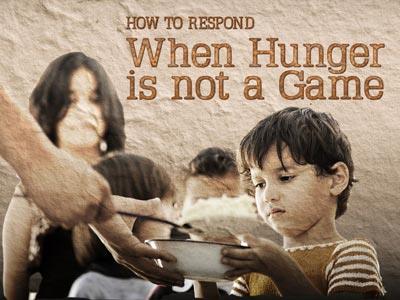-
Feed The Hungry
Contributed by Craig Condon on Nov 28, 2017 (message contributor)
Summary: We must address the needs of those at our doorstep and in our local community, but we can’t be nearsighted. We can’t ignore the desperate needs of the poor worldwide.
“For I was hungry and you fed me…”
In 2000 it was estimated that 925 million people worldwide suffered from hunger, which was caused in part by a spike in global food prices…and you only have to go to Superstore or Sobeys to see how high food prices are these days! Hunger is also the result of the current worldwide recession. In Nova Scotia, food bank use has increased by 33 percent since 2008. The number of working Nova Scotians who are using food banks is also rising because of rising power, fuel and food costs and the lack of affordable housing (and I will discuss the lack of affordable housing in the sermon I will preach in a couple of weeks). People are spending money that would normally go to groceries on necessities such as heat, housing and medication. In fact, there was a story on the television news last week about a couple in Nova Scotia who has to choose between buying prescription pills and putting food on the table.
The statistics are just as startling locally, and I’m speaking from experience because of my work with the local food bank. The Queens County Food Bank currently serves approximately 350 clients ranging from single people to large families. Now we don‘t serve all of these clients every week, and except for emergency situations clients are not supposed to come more than once a month. Even so, the list is not getting smaller. In fact, given the current economic situation in the area-a situation which our Rector referred to in his Lent and Easter message this year-the Food Bank’s Board of Directors expects the client list to grow.
So why am I involved in the local food bank? Well, there are two main reasons. First, lay readers in our Diocese are encouraged to become involved in issues such as parish administration and social justice. In fact, our Diocesan Bishop has a passion for issues relating to social justice.
Second, and more important, is that I am involved with the local food bank is because I believe in Jesus’ words from Matthew 25:31-46. This passage is an example of the Golden Rule-“Do unto others…” Christ calls us to love one another just like he loves us. One way we can show love for our brothers and sisters in Christ is by feeding the hungry, just like Christ fed the multitudes with 5 small loaves of bread and 2 fish. We are called by Christ to speak the gospel plainly while at the same time caring for the poor. If the Salvation Army can successfully do both of these tasks at the same time, so can we. We need each other, and thus we fulfill the love of Christ. We can be heroes by doing what God wants us to do---and what he wants us to do is to do everything we can to help the poor. God does not ask us to give out of what we don’t have, but he does ask us to give out of what we do have.
We must be prepared to minister to the poor and hungry wherever God calls us to minister to them. Whatever we do for the poor will determine our eternal destiny. When God judges us, he will be looking for the answers to three questions:
1. How much truth did he or she know?
2. How many opportunities did the person have to use that truth?
3. What did he or she do with those opportunities?
Jesus is so identified with the poor that he takes our treatment of them as our treatment of him. If we want to call ourselves true followers of Christ, we must act on our ethical teachings, including the teachings related to feeding the hungry. Failing to do good things is just as damning as doing bad things. Our teachings include doing God’s work in a humble manner without expecting anything in return.
In his address to the 2012 National Prayer Breakfast in Washington, D.C., United States President Barack Obama made the following comments:
I think to myself, am I willing…to give up some of the tax breaks I enjoy? For me, as a Christian, it also coincides with Jesus’ teaching that ‘for unto whom much is given, much shall be required.’ It mirrors the Islamic belief that those who’ve been blessed have an obligation to use those blessings to help others, or the Jewish doctrine of moderation and consideration for others.
President Obama went on to speak about his administration’s work with faith-based groups such as World Vision. If the most powerful man in the free world is willing to do what he can to relieve poverty, and if the most powerful country in the free world is willing to do what it can to relieve poverty, surely we as ordinary people can do what we can to ease hunger.

 Sermon Central
Sermon Central



